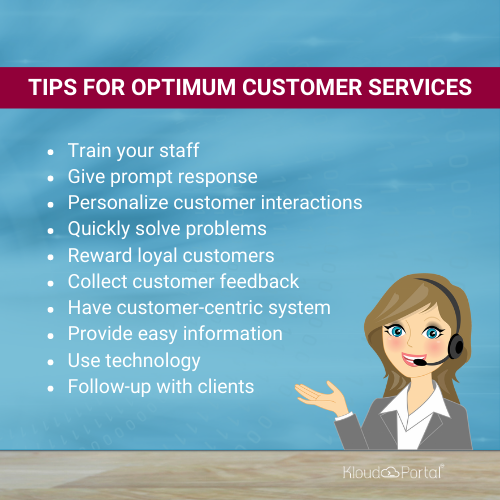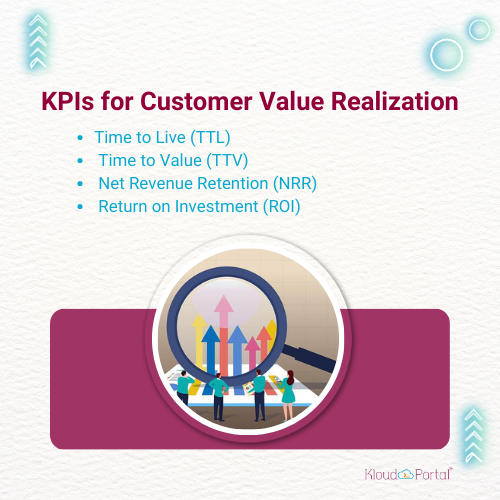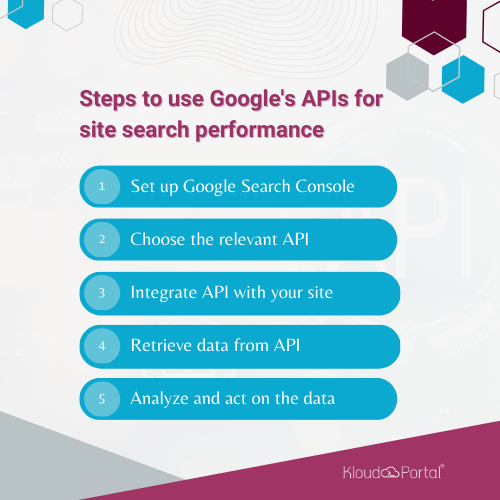
How To Retain Your Customers With Optimum Customer Services?
Customer service is one of the most important factors that can influence the success of any business. Providing optimum customer care can help you retain your customers and build a loyal customer base. Companies selling their products must provide robust services to their end users, and the consumer must be immediately heard.
Effective communication and patience with customers while resolving their issues are good signs of providing optimum service. Customer care professionals should be friendly, attentive, and empathetic towards and guide customers, making them feel valued and respected. KloudPortal is a pioneer in providing its valued customers with the best Digital Marketing services.
Providing optimum customer care through personalized assistance will ensure client satisfaction. Prioritizing digital marketing is more crucial than ever in a highly competitive marketplace. To retain customers, businesses must exceed their expectations by delivering exceptional customer service experiences, catering to their needs, and creating positive interactions that leave a lasting impression. Delivering outstanding customer service is essential for retaining customers, building a loyal customer base, and growing a successful business.
What we cover in this blog?
How to retain your customers?
1. Train your staff
One of the key elements of providing excellent customer service is having a team of well-trained staff. Your staff should be knowledgeable about brand building, products, and services, and importantly, be patient and have excellent communication skills. A customer representative is the face of your organization. Train them on how to handle different situations, how to empathize with customers, and how to resolve customer issues.
Paying attention to and empathizing with their grievances is key to gaining trust and customer loyalty. It can give us the advantage of pre-empting potential issues or challenges, allowing us to proactively address them before they escalate into major problems. Regular staff training will help them provide the best possible customer service.
2. Respond promptly to customers
It is crucial to heed customers’ inquiries and worries as they expect prompt attention. Research reveals that 90% of consumers anticipate an immediate response when they contact customer service.
It is imperative to reach out to them promptly through various communication channels such as email, chat, phone, or social media to foster trust and establish a strong rapport with your clients. By doing so, your clients will feel valued, increasing the likelihood of repeat business.
3. Personalize your customer interactions
It is crucial to personalize customer interactions by tailoring them to individual needs to enhance the consumer experience. Contact customers by name, show that you pay attention to their preferences, and personalize your interactions accordingly. This approach creates a unique customer experience that makes them feel valued and appreciated, fostering a stronger customer relationship. Personalized communication during events, sign-ups, or other interactions can further enhance customer loyalty and satisfaction.
4. Solve problems quickly
Professionally dealing with customers is essential to maintaining a positive relationship. When communicating with customers, being mindful of the person on the other end of the line is important. Personalizing your approach can go a long way in building trust and loyalty.
Additionally, pricing can be a sensitive issue for some customers, so it’s essential to be transparent and clear when discussing costs. Being upfront about the price can prevent misunderstandings and potential conflicts down the line. Overall, you can establish a strong relationship and promote customer satisfaction by handling interactions with customers courteously and respectfully.
5. Reward your loyal customers
Rewarding your loyal customers is a great way to retain them. Offer loyalty programs, discount coupons, discounts on select products, free products, sales, and rewards to customers who have been with you for a long time. The reward will show your clients that you appreciate the business and respect the value of their patronage.
Loyal consumers are also more likely to refer new customers to your business, which can help you grow your customer base. A simple “thank you” can go a long way when providing customer service.
6. Use customer feedback
Collecting consumer feedback is crucial for improving customer service. You can obtain feedback through surveys, social media, or phone. Addressing any customer issues and implementing necessary changes to enhance their experience with your company is mandatory. Consistently seeking and acting on customer feedback can help build customer loyalty and trust.
7. A customer-centric culture
Having a customer-centric support system is crucial to a company’s success. Every employee, from the CEO to the receptionist, should understand the importance of the customer service process. Encourage your team to prioritize client needs and develop a customer-first mindset.
Understanding your customer’s needs is also essential to providing excellent customer service. By using a fixed system of asking questions and offering good deals, you can get to know your customers better. Social media can also provide insights into your customers’ likes, habits, and purchasing behavior. Use these tips to retain customers and stand out from the competition while enhancing your understanding of your clients.

8. Provide easy access to information
Customer retention is essential to the success of any company, and making information easily accessible is one way to retain consumers. To achieve this, ensure that customers can quickly access data about your products or services. Providing clear and concise details on your website, manuals, and other materials can help consumers better understand your company’s offerings.
Additionally, offering good deals can also help retain customers. Understanding your customers’ needs and preferences is crucial to retaining them. Utilizing these strategies can enhance client satisfaction and promote long-term loyalty.
9. Use technology to enhance customer service
Technology can be a valuable tool for enhancing customer service. For example, you can use chatbots to provide customers with quick answers to their inquiries. You can also use social media to interact with clients and cater to their complaints or concerns. Technology can also be used to personalize customer service. You could use data analytics to personalize offers and promotions for individual customers.
KloudPortal provides the best digital marketing services and also delivers exceptional customer service that goes above and beyond.
10. Follow up with clients
Companies must follow up with customers after a purchase or interaction to retain them. Show consumers that you care about their satisfaction and are willing to go the extra mile to ensure they are happy with your products or services. You can follow up with customers through email, phone, or mail. You can also use customer surveys to gather feedback on their experience with your business.
Conclusion
Providing exceptional customer service is critical to brand building and marketing strategy. It can create a positive brand image, improve customer engagement, and increase loyalty and retention rates. Digital marketing platforms can help businesses interact with customers, gather feedback, and address concerns in real-time to enhance satisfaction.
Prioritizing excellent customer service and leveraging platforms can help enhance brand reputation and build long-term customer relationships. KloudPortal is a one-stop solution if you are looking for an optimum customer service experience. So, contact us today.












